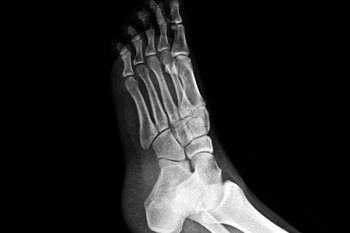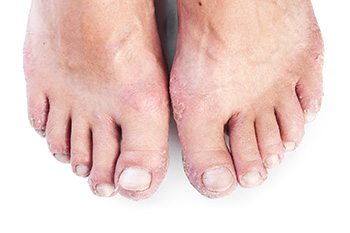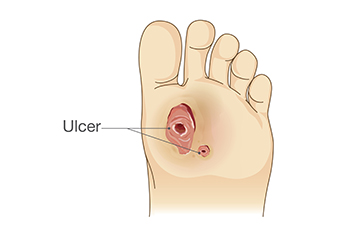Connect With Us
Blog
Items filtered by date: July 2024
What Is a Metatarsal Stress Fracture?

A metatarsal stress fracture is a tiny crack in one of the long bones of the foot, often caused by repetitive stress or overuse during activities like running or jumping. Symptoms include localized pain, swelling, and tenderness that worsens with activity. Preventing metatarsal stress fractures involves gradually increasing activity levels, wearing supportive footwear, and incorporating rest days into your exercise routine. Proper warm-up and stretching before activities can also reduce the risk. Treatment typically includes rest, icing the affected area, and using orthotics or supportive footwear to relieve pressure on the foot. In severe cases, immobilization with a cast or walking boot may be necessary. A podiatrist can conduct a thorough evaluation, possibly using imaging studies, and recommend appropriate treatments to promote healing and prevent further injury. Early intervention can speed up recovery and prevent long-term complications. If you suspect a metatarsal stress fracture or experience persistent foot pain, it is suggested that you make an appointment with a podiatrist.
Foot Pain
Foot pain can be extremely painful and debilitating. If you have a foot pain, consult with Rahil Baxamusa, DPM from Illinois. Our doctor will assess your condition and provide you with quality foot and ankle treatment.
Causes
Foot pain is a very broad condition that could be caused by one or more ailments. The most common include:
- Bunions
- Hammertoes
- Plantar Fasciitis
- Bone Spurs
- Corns
- Tarsal Tunnel Syndrome
- Ingrown Toenails
- Arthritis (such as Gout, Rheumatoid, and Osteoarthritis)
- Flat Feet
- Injury (from stress fractures, broken toe, foot, ankle, Achilles tendon ruptures, and sprains)
- And more
Diagnosis
To figure out the cause of foot pain, podiatrists utilize several different methods. This can range from simple visual inspections and sensation tests to X-rays and MRI scans. Prior medical history, family medical history, and any recent physical traumatic events will all be taken into consideration for a proper diagnosis.
Treatment
Treatment depends upon the cause of the foot pain. Whether it is resting, staying off the foot, or having surgery; podiatrists have a number of treatment options available for foot pain.
If you have any questions, please feel free to contact our office located in Crystal Lake, IL . We offer the newest diagnostic and treatment technologies for all your foot care needs.
How Psoriatic Arthritis Affects the Feet
 Psoriatic arthritis, or PsA, can significantly affect the feet, leading to symptoms like swelling, soreness, and stiffness. Walking or standing for prolonged periods may become uncomfortable, and shoes might feel tight due to swelling. Common issues resulting from psoriatic arthritis can include swelling of the ankle and big toe, plantar fasciitis, and pain in the Achilles tendon. Symptoms can fluctuate, so it is important to monitor and address them early. This can help to prevent long-term problems, such as an elongated big toe and stiff toe joints. A podiatrist can play a key role in managing symptoms of psoriatic arthritis by providing a treatment plan, which may include specific exercises and stretches that protect and maintain joint flexibility. A podiatrist also can recommend proper footwear and prescribe custom shoe orthotics to relieve pressure and offer stability. If you are experiencing foot pain resulting from psoriatic arthritis, it is suggested that you schedule an appointment with a podiatrist for an exam, diagnosis, and treatment options.
Psoriatic arthritis, or PsA, can significantly affect the feet, leading to symptoms like swelling, soreness, and stiffness. Walking or standing for prolonged periods may become uncomfortable, and shoes might feel tight due to swelling. Common issues resulting from psoriatic arthritis can include swelling of the ankle and big toe, plantar fasciitis, and pain in the Achilles tendon. Symptoms can fluctuate, so it is important to monitor and address them early. This can help to prevent long-term problems, such as an elongated big toe and stiff toe joints. A podiatrist can play a key role in managing symptoms of psoriatic arthritis by providing a treatment plan, which may include specific exercises and stretches that protect and maintain joint flexibility. A podiatrist also can recommend proper footwear and prescribe custom shoe orthotics to relieve pressure and offer stability. If you are experiencing foot pain resulting from psoriatic arthritis, it is suggested that you schedule an appointment with a podiatrist for an exam, diagnosis, and treatment options.
Arthritis can be a difficult condition to live with. If you are seeking treatment, contact Rahil Baxamusa, DPM from Illinois. Our doctor can provide the care you need to keep you pain-free and on your feet.
Arthritic Foot Care
Arthritis is a term that is commonly used to describe joint pain. The condition itself can occur to anyone of any age, race, or gender, and there are over 100 types of it. Nevertheless, arthritis is more commonly found in women compared to men, and it is also more prevalent in those who are overweight. The causes of arthritis vary depending on which type of arthritis you have. Osteoarthritis for example, is often caused by injury, while rheumatoid arthritis is caused by a misdirected immune system.
Symptoms
- Swelling
- Pain
- Stiffness
- Decreased Range of Motion
Arthritic symptoms range in severity, and they may come and go. Some symptoms stay the same for several years but could potentially get worse with time. Severe cases of arthritis can prevent its sufferers from performing daily activities and make walking difficult.
Risk Factors
- Occupation – Occupations requiring repetitive knee movements have been linked to osteoarthritis
- Obesity – Excess weight can contribute to osteoarthritis development
- Infection – Microbial agents can infect the joints and trigger arthritis
- Joint Injuries – Damage to joints may lead to osteoarthritis
- Age – Risk increases with age
- Gender –Most types are more common in women
- Genetics – Arthritis can be hereditary
If you suspect your arthritis is affecting your feet, it is crucial that you see a podiatrist immediately. Your doctor will be able to address your specific case and help you decide which treatment method is best for you.
If you have any questions, please feel free to contact our office located in Crystal Lake, IL . We offer the newest diagnostic and treatment technologies for all your foot care needs.
See Your Foot Specialist Regularly If You Work On Your Feet
What Are Diabetic Foot Ulcers?

Diabetic foot ulcers are serious complications of diabetes, characterized by open sores or wounds that typically develop on the feet. They result from poor circulation, nerve damage, also called neuropathy, and impaired immune function associated with diabetes. Treatment involves meticulous wound care, which includes cleaning the ulcer with gentle soap and water, applying antibiotic ointment, and covering it with a sterile dressing. Offloading pressure from the affected foot is important to prevent further irritation and aid healing. Podiatrists can conduct regular exams to monitor ulcers, assess circulation, and provide guidance on footwear and hygiene. Timely intervention can prevent complications such as infections or amputations. If you have diabetes, it is strongly suggested you visit a podiatrist who can help you to manage this condition.
Wound care is an important part in dealing with diabetes. If you have diabetes and a foot wound or would like more information about wound care for diabetics, consult with Rahil Baxamusa, DPM from Illinois. Our doctor will assess your condition and provide you with quality foot and ankle treatment.
What Is Wound Care?
Wound care is the practice of taking proper care of a wound. This can range from the smallest to the largest of wounds. While everyone can benefit from proper wound care, it is much more important for diabetics. Diabetics often suffer from poor blood circulation which causes wounds to heal much slower than they would in a non-diabetic.
What Is the Importance of Wound Care?
While it may not seem apparent with small ulcers on the foot, for diabetics, any size ulcer can become infected. Diabetics often also suffer from neuropathy, or nerve loss. This means they might not even feel when they have an ulcer on their foot. If the wound becomes severely infected, amputation may be necessary. Therefore, it is of the upmost importance to properly care for any and all foot wounds.
How to Care for Wounds
The best way to care for foot wounds is to prevent them. For diabetics, this means daily inspections of the feet for any signs of abnormalities or ulcers. It is also recommended to see a podiatrist several times a year for a foot inspection. If you do have an ulcer, run the wound under water to clear dirt from the wound; then apply antibiotic ointment to the wound and cover with a bandage. Bandages should be changed daily and keeping pressure off the wound is smart. It is advised to see a podiatrist, who can keep an eye on it.
If you have any questions, please feel free to contact our office located in Crystal Lake, IL . We offer the newest diagnostic and treatment technologies for all your foot care needs.
Signs of an Achilles Tendon Rupture
 An Achilles tendon rupture is a serious injury that requires immediate attention. Common signs include a sudden, sharp pain in the back of the ankle or calf, often described as feeling like a direct hit or a snap. Swelling and bruising typically develop quickly surrounding the heel and lower leg. Individuals may also experience difficulty while walking, standing on tiptoe, or pushing off the injured foot. A noticeable gap or indentation above the heel is a clear indication of a rupture. Weakness in the affected leg and a decrease in range of motion are also symptoms. If you have pain in the back of the ankle, it is suggested that you confer with a podiatrist who can diagnose and treat Achilles tendon injuries.
An Achilles tendon rupture is a serious injury that requires immediate attention. Common signs include a sudden, sharp pain in the back of the ankle or calf, often described as feeling like a direct hit or a snap. Swelling and bruising typically develop quickly surrounding the heel and lower leg. Individuals may also experience difficulty while walking, standing on tiptoe, or pushing off the injured foot. A noticeable gap or indentation above the heel is a clear indication of a rupture. Weakness in the affected leg and a decrease in range of motion are also symptoms. If you have pain in the back of the ankle, it is suggested that you confer with a podiatrist who can diagnose and treat Achilles tendon injuries.
Achilles tendon injuries need immediate attention to avoid future complications. If you have any concerns, contact Rahil Baxamusa, DPM of Illinois. Our doctor can provide the care you need to keep you pain-free and on your feet.
What Is the Achilles Tendon?
The Achilles tendon is a tendon that connects the lower leg muscles and calf to the heel of the foot. It is the strongest tendon in the human body and is essential for making movement possible. Because this tendon is such an integral part of the body, any injuries to it can create immense difficulties and should immediately be presented to a doctor.
What Are the Symptoms of an Achilles Tendon Injury?
There are various types of injuries that can affect the Achilles tendon. The two most common injuries are Achilles tendinitis and ruptures of the tendon.
Achilles Tendinitis Symptoms
- Inflammation
- Dull to severe pain
- Increased blood flow to the tendon
- Thickening of the tendon
Rupture Symptoms
- Extreme pain and swelling in the foot
- Total immobility
Treatment and Prevention
Achilles tendon injuries are diagnosed by a thorough physical evaluation, which can include an MRI. Treatment involves rest, physical therapy, and in some cases, surgery. However, various preventative measures can be taken to avoid these injuries, such as:
- Thorough stretching of the tendon before and after exercise
- Strengthening exercises like calf raises, squats, leg curls, leg extensions, leg raises, lunges, and leg presses
If you have any questions please feel free to contact our office located in Crystal Lake, IL . We offer the newest diagnostic tools and technology to treat your foot and ankle needs.
Various Congenital Foot Conditions

Congenital foot problems encompass a range of conditions that affect foot development from birth. Clubfoot is characterized by inwardly turned feet and twisted ankles, often requiring corrective casting or surgery early in infancy. Larsen syndrome involves multiple joint abnormalities, including clubfoot, and requires comprehensive manipulation. Metatarsus adductus causes the front part of the foot to turn inward, usually resolving with stretching exercises or corrective shoes. Metatarsus varus results in a curved appearance of the foot bones, treated similarly to metatarsus adductus. These conditions can impact mobility and foot alignment if left untreated, potentially leading to discomfort and difficulties in walking. Early diagnosis and intervention are essential for addressing congenital foot problems, often involving a combination of specific techniques to promote proper foot development and functionality from infancy through childhood. If your child has been born with a congenital foot condition, it is strongly suggested that you have a podiatrist on your healthcare team who can guide you to an effective treatment strategy.
Congenital foot problems require immediate attention to avoid future complications. If you have any concerns, contact Rahil Baxamusa, DPM of Illinois. Our doctor can provide the care you need to keep you pain-free and on your feet.
Congenital foot problems are deformities affecting the feet, toes, and/or ankles that children are born with. Some of these conditions have a genetic cause while others just happen. Some specific foot ailments that children may be born with include clubfeet, polydactyly/macrodactyly, and cleft foot. There are several other foot anomalies that can occur congenitally. What all of these conditions have in common is that a child may experience difficulty walking or performing everyday activities, as well as trouble finding footwear that fits their foot deformity. Some of these conditions are more serious than others. Consulting with a podiatrist as early as possible will help in properly diagnosing a child’s foot condition while getting the necessary treatment underway.
What are Causes of Congenital Foot Problem?
A congenital foot problem is one that happens to a child at birth. These conditions can be caused by a genetic predisposition, developmental or positional abnormalities during gestation, or with no known cause.
What are Symptoms of Congenital Foot Problems?
Symptoms vary by the congenital condition. Symptoms may consist of the following:
- Clubfoot, where tendons are shortened, bones are shaped differently, and the Achilles tendon is tight, causing the foot to point in and down. It is also possible for the soles of the feet to face each other.
- Polydactyly, which usually consists of a nubbin or small lump of tissue without a bone, a toe that is partially formed but has no joints, or an extra toe.
- Vertical talus, where the talus bone forms in the wrong position causing other bones in the foot to line up improperly, the front of the foot to point up, and the bottom of the foot to stiffen, with no arch, and to curve out.
- Tarsal coalition, when there is an abnormal connection of two or more bones in the foot leading to severe, rigid flatfoot.
- Cleft foot, where there are missing toes, a V-shaped cleft, and other anatomical differences.
- Macrodactyly, when the toes are abnormally large due to overgrowth of the underlying bone or soft tissue.
Treatment and Prevention
While there is nothing one can do to prevent congenital foot problems, raising awareness and receiving neonatal screenings are important. Early detection by taking your child to a podiatrist leads to the best outcome possible.
If you have any questions please feel free to contact our office located in Crystal Lake, IL . We offer the newest diagnostic tools and technology to treat your foot and ankle needs.
Blog Archives
- March 2025
- February 2025
- January 2025
- December 2024
- November 2024
- October 2024
- September 2024
- August 2024
- July 2024
- June 2024
- May 2024
- April 2024
- March 2024
- February 2024
- January 2024
- December 2023
- November 2023
- October 2023
- September 2023
- August 2023
- July 2023
- June 2023
- May 2023
- April 2023
- March 2023
- February 2023
- January 2023
- December 2022
- November 2022
- October 2022
- September 2022
- August 2022
- July 2022
- June 2022
- May 2022

